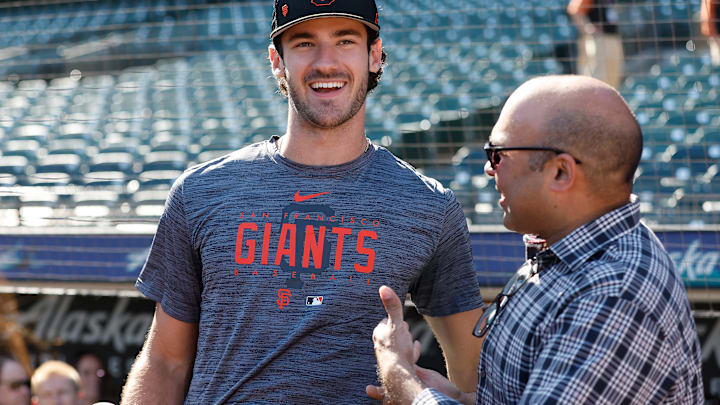When the SF Giants hired Farhan Zaidi as team president of baseball operations in November of 2018, they hoped he would help bring a sustainably competitive roster. That goal has not come to fruition as the Giants have finished at or below .500 for the past two seasons, so why does the front office have such a long leash?
Why does the SF Giants front office have such a long leash?
Zaidi invested a lot of equity into hiring Gabe Kapler as manager four years ago. Now, the Giants will be searching for a new manager after dismissing Kapler with one year remaining on his contract. The decision to fire him does paint the former Giants manager as the scapegoat, but the organization's failures over the past couple of seasons extend well beyond who is in the dugout.
The question has arisen as to why Zaidi and his front office are in a position to even pick a new manager. He will be entering his sixth season as the head of the front office, but there has not been nearly enough progress at improving the roster. That said, he has made a lot of nice moves but has yet to really make a big addition.
Shortly after Zaidi was hired, the Baltimore Orioles added Mike Elias as their general manager. As such, it has become natural to compare and contrast the Orioles to the Giants.
Elias and the Orioles will reach the playoffs after posting a 101-61 record in a very tough AL West. The competitive window is wide open for them and they have established a farm system that will seemingly feed the major league roster for the next several seasons.
Meanwhile, the Giants finished with a 79-83 record, which was good enough for fourth place in the NL West. Zaidi will likely begin next season on the hot seat as his contract expires after the 2024 season. The Giants have missed the playoffs for the sixth time in seven seasons and no one really has an idea when that competitive window will reopen. Zaidi needs that to happen sooner rather than later.
This was the first season in which the farm system has fed the major league roster in years but that process has taken longer than expected. And, much longer compared to the recent success that the Orioles have had.
I understand that the timing of the hires are why the front offices compared, but it is often a lazy comparison. When Elias took over, there were only three players on the payroll with an average annual value of over $10 million. One of those (Mark Trumbo) fell off of the books after the 2019 season.
Alex Cobb was on the books through 2021, but he was shipped to the Los Angeles Angels after the 2020 season. Chris Davis' seven-year, $161 million contract ran through 2022, but he retired after the 2020 season. It was very easy for the Orioles to tank and that is what they did for the next several seasons. This led to better draft positions, which led to them collecting an impressive array of talent. Was that the right call? It is paying dividends today, but I question the authenticity of the approach.
The Giants were not in that same position. When Zaidi took over, they had a payroll of $187 million against the cap in 2019 and had flirted with the Competitive Balance Tax in the prior two seasons. To get under it, the front office did so by simply not making a long-term addition.
Each of the players they signed were added on one-year deals with many being well past their prime. That said, they still had considerable payroll commitments over the next several seasons. For example, Evan Longoria was still on the books in 2023 with his $5 million buyout from last season. He is the last payroll commitment that Zaidi inherited.
The roster consisted of aging veterans on long-term deals, many of whom had several years remaining when Zaidi took over. It was a roster that was too good to tank but too costly to sell off for prospect capital. For a front office that values flexibility, the roster he inherited was one that was one that could only be improved around the margins.
The past two seasons are really the first in which the roster reflects the front office's vision as many of those contracts came off of the books in 2021 or before. That said, Zaidi's vision has not led to much inspiration.
This is all a long-winded way of saying that the ownership knew that the rebuild was going to be a long process. Though, they never called it a rebuild, that is how the front office operated for the first couple of seasons. Even though Zaidi is technically heading into his sixth season, which is a long time for an executive to make an impact. Ownership is possibly viewing this as his fourth or fifth year at the helm.
Is that the right way to interpret it? Does Zaidi deserve as long of a leash as he received? Those are certainly up for debate and you can argue the merits of either side of keeping him or not. The Giants knew this would be a long process. Though, after finishing at or below .500 in four of the last five seasons, patience has waned.
That is true of the fans and likely ownership as well. Ownership cannot be happy with a product that won 79 games in 2023 after committing $220 million against the cap. That is not a great return on investment and Zaidi is managing the portfolio. He has been given a long leash, but he will not be so lucky next season.
